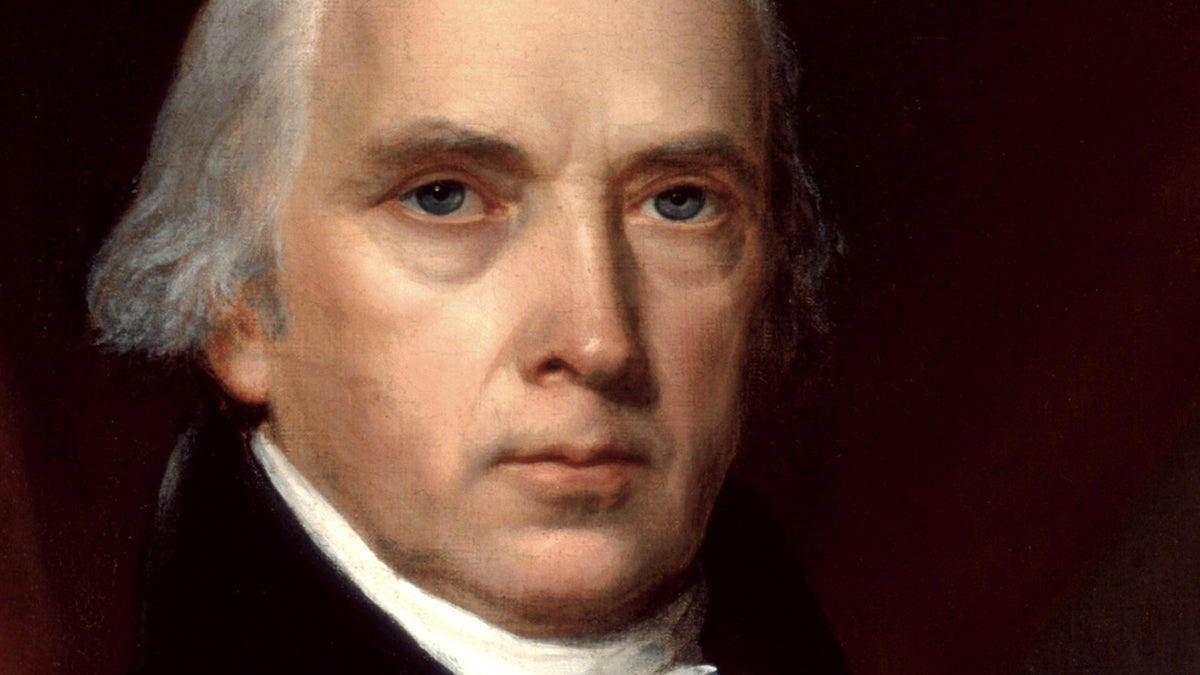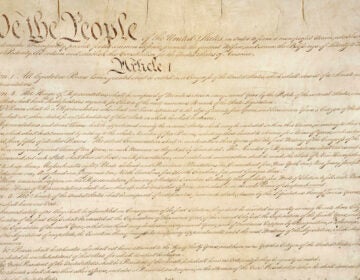Our 45th president could learn a lot from our 4th president
We tend to look to the past for guidance and wisdom. There are cues that today's political class should take from the fourth president of the United States, James Madison.

John Vanderlyn's portrait of James Madison, fourth president of the United States, hangs in the White House.
We tend to look to the past, especially our Founding Fathers (and Mothers), for guidance and wisdom. Such reflection can be beneficial when not taken to extremes.
Recently, it seems that Alexander Hamilton has been getting a lot of admiration, and deservedly so. His rise from a dependent immigrant to a pivotal player in the formation of our nation is a story worth examining. However, there is another founder who was equally pivotal and whose politics and accomplishments deserve a second look: Hamilton’s contemporary, James Madison, a prime author of the U.S. Constitution, secretary of state, and the fourth president of the United States.
While Madison’s and his fellow Virginia plantation class’ view on slavery is inexcusable — especially compared to Hamilton’s abolitionism — there are still many cues that today’s political class should take from him.
Small-R republicanism
First, Madison represented the values of Jeffersonian republicanism — including individual liberty, limited government, respect for nature, and an upwardly mobile middle-class democracy. The underlying principle of Jeffersonian republicanism was a diffusion, as opposed to a concentration, of power in all of its forms.
Early in his career, because of the persecution of Baptists, Madison worked to enact statutes guaranteeing religious freedom. Later, he championed a Constitutional Convention in order to create a federal government capable of providing a balance to the power of the states. The document he drafted not only achieved this balance but also provided equity among states and checks on power within the federal government. He went on to author the Bill of Rights to enshrines many of our individual liberties against overreach by the federal government.
Contrast these Jeffersonian values with the leading principles of today’s political class. There are two factions within the modern Democratic Party. One appears to promote equality as an ends rather than a means to upward mobility. The other supports a Hamiltonian outlook of big government regulating big business.
Meanwhile, the Republicans are divided into two camps. One exemplifies a pure laissez-faire approach to economic issues, coupled with a cultural conformity. This leads to a concentration of economic power while stifling individual liberty. The other GOP faction, led by the current administration, seems to be an conglomeration of nativism and corporatism.
A president guided by facts
Second, Madison was a pragmatist who based his policies not on rigid ideology but rather on facts on the ground. Despite a concern about a standing military, Madison took the United States to war against Britain in 1812 when he felt our sovereignty was threatened. He also came to support the 2nd Bank of the United States after opposing the 1st Bank. He changed his mind because he realized the important role the bank served in maintaining national credit.
He even battled the radicals in his own party, the “tertium quids,” who criticized both Madison and Jefferson for not maintaining proper party orthodoxy. These actions stand in sharp contrast to today’s government shutdowns, debt ceiling debates, and sequestration.
A need for compromise
Finally, unlike our current president, Madison truly understood the art of the deal. He facilitated one of the most famous compromises of the early republic, the Compromise of 1790. Hamilton backed the plan to locate the new capital in the South, and Jefferson and Madison agreed to his plan for the federal government to assume the debt of the states. This compromise broke a deadlock in Congress.
Such political skill today is desperately lacking. Instead of grand bargains on tax reform, health care, and infrastructure, we get tweet-storms and confusion.
A new Madisonian agenda
What might a 21st century Madisonian agenda espouse? How would it diffuse political and economic power and counter what Jeffrey Rosen, in his recent biography of Louis Brandeis, referred to as “Bigness”?
On foreign policy, the United States would not be hesitant to use military force when necessary, but the main instrument of defending Western values would be an “Empire of Liberty” — free-trade agreements like the Trans-Pacific Partnership that create a level playing field, and multi-national agreements and organizations like NATO, the UN, and G20.
Domestic policy would promote free and fair enterprise without laissez-faire capitalism or over-regulation. The risk of both government and private-sector monopoly would be mitigated. There would be a focus on solutions at the local level, equality of opportunity, civil liberties, science, and cultural pluralism.
For example, a modern-day Madison would agree that the Affordable Care Act addresses the problem of access to health care. However, he would also be willing to seek reforms that might be uncomfortable for a lot of current stakeholders in order to address the issues of productivity, a culture of overuse, and industry consolidation.
Research and development must be expanded not just for cutting-edge treatments but also to encourage local innovation in delivery, perhaps, a “Race to the Top” for Medicaid funding for states. Communities and education should continue to promote healthy lifestyles and preventive medicine, such as former First Lady Michelle Obama’s programs for school meals and her “Let’s Move” campaign.
Regulation should be transferred to the states, including the self-insurance of large corporations. Consolidation of insurers and providers must also be reviewed, and limits on size should be considered. Funding should take into account Madisonian pragmatism to include the possibility of taxation of employer-provided health care and on “junk foods.”
The United States has its challenges. Unfortunately, the drift has been to ideas that either will not solve those problems or will make them worse. Perhaps, it is time that James Madison and his Jeffersonians take their place in the sun.
WHYY is your source for fact-based, in-depth journalism and information. As a nonprofit organization, we rely on financial support from readers like you. Please give today.



